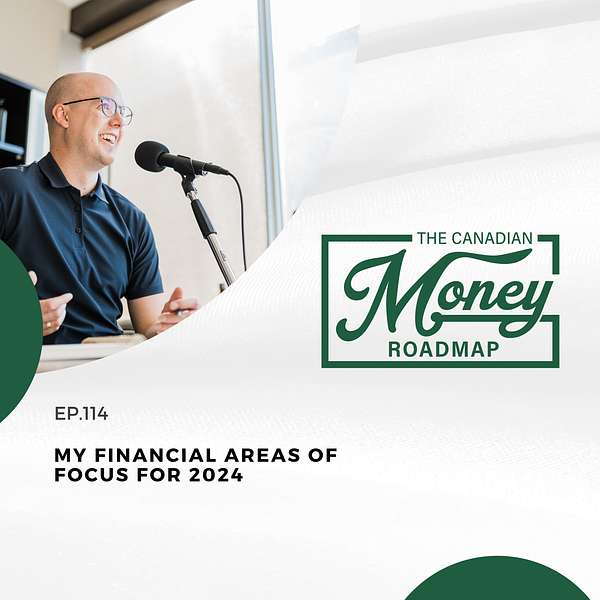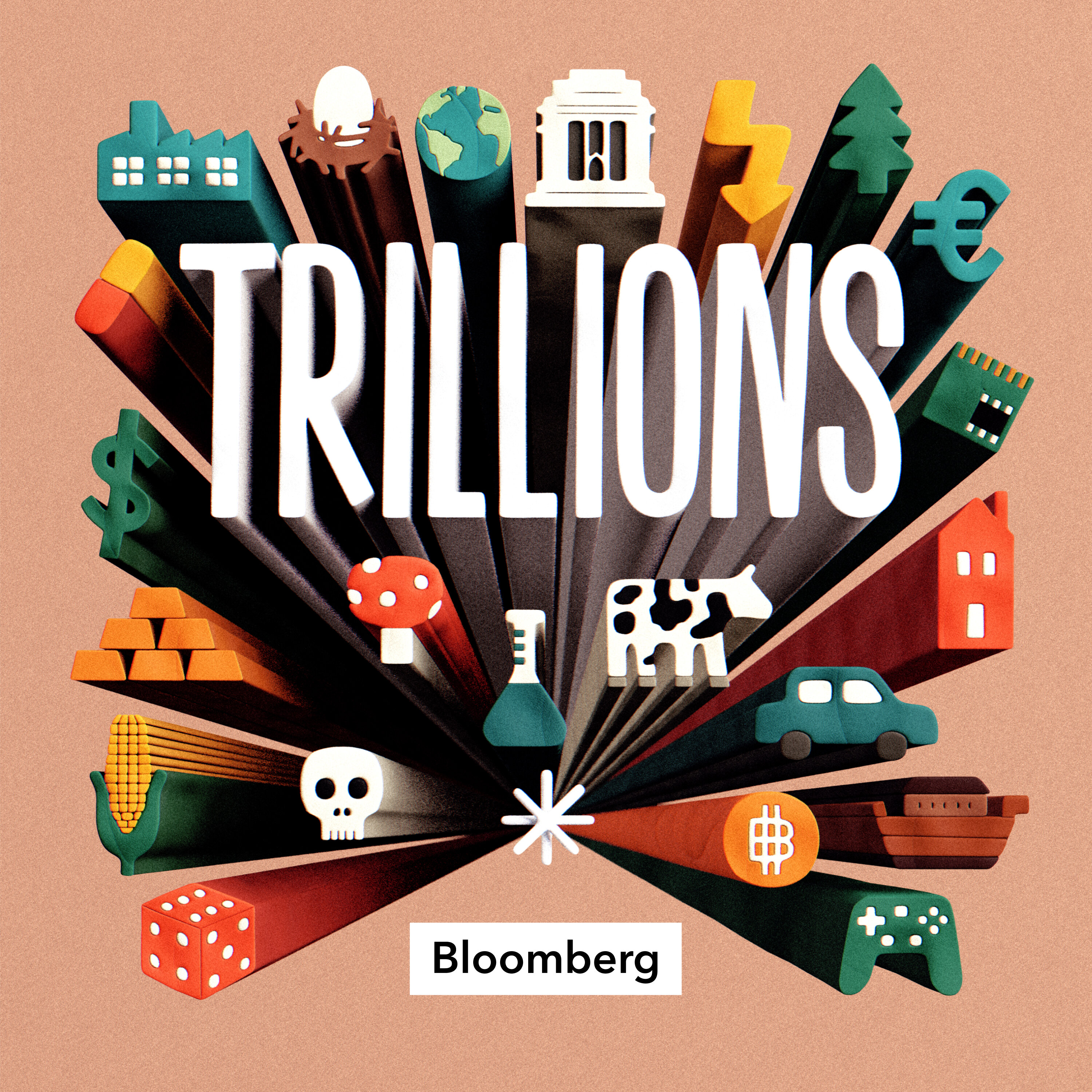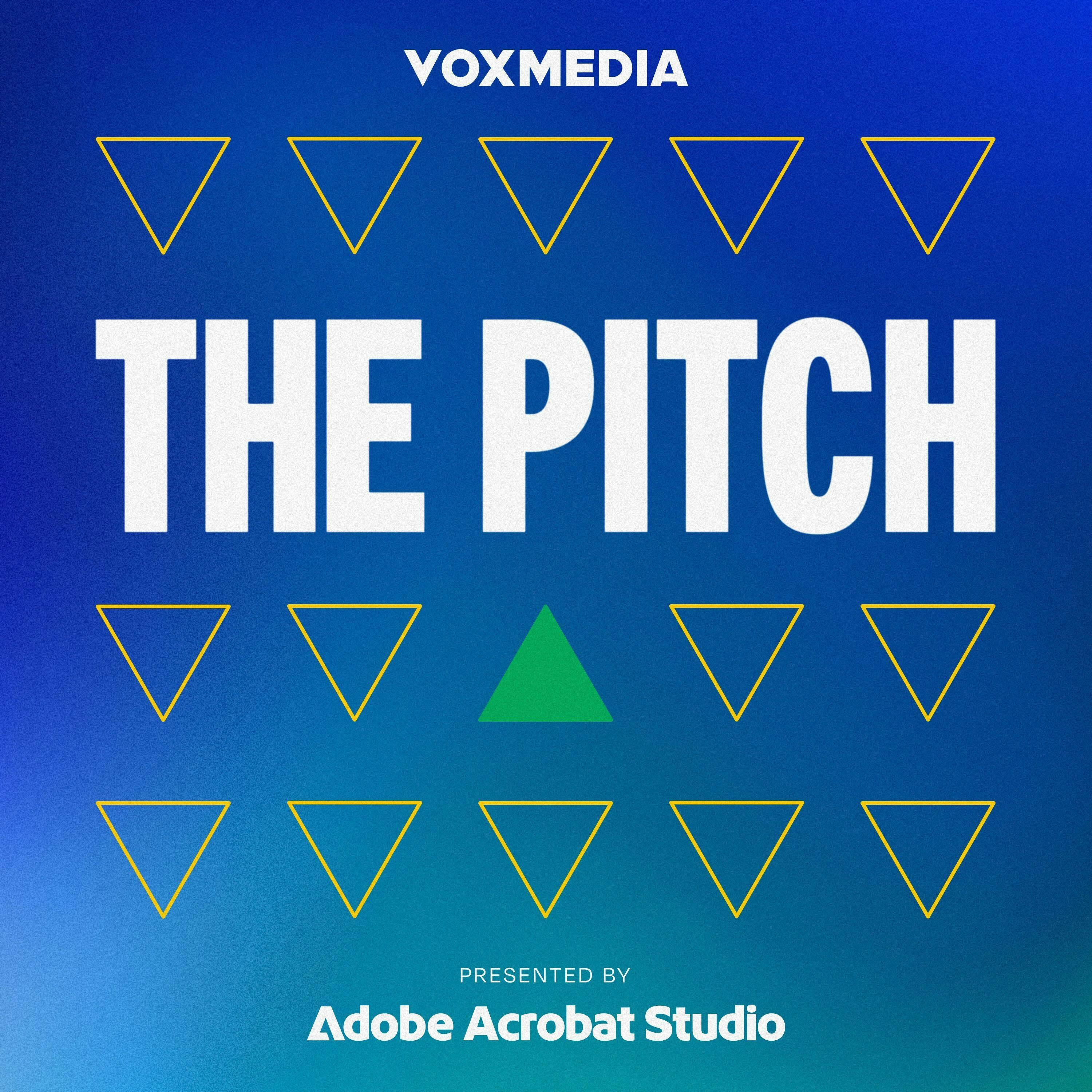
The Canadian Money Roadmap
Invest smarter, master your money, live & give more
The Canadian Money Roadmap
My Financial Areas of Focus For 2024
I don't like goals... I like processes and systems and rituals that will eventually lead to accomplishing goals. I just call them, Areas of Focus.
In this episode, I will go through my personal areas of focus for my financial life this year.
🌳 Connect with Evan and Cedar Point Wealth | Services and Pricing
🗣️ I want to hear from you! Record your question here and you could be featured on an upcoming episode of the podcast
✨ Get your money organized - Your Full Financial Picture Spreadsheet
Hello and welcome back to the Canadian Money Roadmap podcast. I'm your host, evan Neveldi. On today's episode, I'm going to go through three things that are my financial areas of focus for 2024. It might give you a few ideas of things that you could include for your areas of focus for this year, but I just want to be transparent with the things that I'm working on in my own life. Welcome back to another episode here in 2024. This is the time of year where a lot of people are looking forward to the upcoming year, maybe setting some goals or things that they want to achieve for the year that is to come. This episode is going to be coming out on January 10th, and so maybe by now you've already abandoned your goals or your resolutions or whatever for the year Totally understandable. Maybe let's use this episode as a kicking off point for the rest of the year and I'll tell you a little bit about what I think about financial New Year's resolutions or things like that. So maybe we'll start right there. Oftentimes, I find that goals set at the New Year's time for the year that's coming up are often maybe a little too lofty or too maybe too ambitious for a short period of time, like a year, and so, instead of setting result based goals, I like to set more like process based goals or routine based goals, or what I just call areas of focus over a short period of time like a year. The inputs are the things that will eventually lead to outputs. I was saw a video from a guy named Donald Miller he's written a couple of books that I really like and he says that you should be fighting for your routine, because your routines will help your goals take care of themselves. Right, so if you're focusing on the inputs, the outputs become a lot easier to accomplish. So some of the things that I'm working on for this year of my areas of focus are a little bit different than last year. Last year, one of the ones that I'm remembering off the top of my head anyways was I wanted to increase liquidity because, looking at my full financial picture, the largest portion of my net worth was tied up in fixed assets, and so I wanted to increase liquid assets, to create flexibility and optionality with my money and also participate in the stock markets even more. So what happened? Well, last year things changed and I bought a new house. My wife and I. We bought a new house in the middle of the year. So a lot of that liquidity that we were building up in the first half of the year, guess where it went? It went into the new house. It went into new furniture and all sorts of things, and so last year ended up being a bit of a write off in terms of taking a look at expenses or things that might be regular expenses, because buying a new house it's a pretty major expense. But along with that came a few other wrinkles. So, due to my employment, I'm technically self-employed, and not only self-employed. I get paid dividends out of a holding company and from a lender's perspective, that is much more difficult to quantify. From a risk perspective, they don't really like seeing that on a loan application. I had a vehicle loan that was literally 0%. However, just having that payment really threw off my ratios for applying for the new mortgage and I didn't really have a whole lot of other options, just due to the fact of how I'm paid. I'm not paid a typical salary, and so one thing that I had to do before applying for the mortgage I had to pay off my car loan. So the lender actually valued the debt being paid off way higher than the fact that I had cash on hand to do it, and so, yeah, it was kind of a silly thing. I might have talked about this on the podcast before, but, yeah, I paid off a 0% car loan to be able to get into a new mortgage at 4.5%. Woo, that's kind of brutal trade off there, but it was one of the things that kind of happens when you're making big financial decisions. So, you know, along with buying a house, I had to pay off a vehicle, and that took up some cash. We moved into a home that was new to us, so we were the first owners. It's in a new neighborhood here in Saskatoon, and so landscaping had to be done at our expense as well. We were planning on doing that this year, but the landscaping company that we were working with was able to get us in right at the end of the year, and so we decided let's just do it. And so we did all of our landscaping, added a little extension to our deck, put in some grass and some trees and things like that, and then guess what happens after that? Oh, yeah, it's Christmas. There's all the gifts that come along with that. We were planning a vacation coming up here in February and so paying for that in advance, I needed some new equipment here at the office, some audio and video equipment and a computer. All sorts of big things that were kind of one-off expenses that were relatively atypical. I mentioned Christmas in there. That seems to come up every year, but a lot of those other things like the new home purchases paying off a vehicle, landscaping. We had to buy a bunch of furniture and we have two kids at home you know as well as I do that paying for groceries and all that kind of stuff just gets expensive. So my first area of focus for 2024 is I need to track my expenses because these have all meaningfully changed this year, and maybe not all of them, but a lot of the big ones. So the mortgage is different, taxes are different, insurance is different, all sorts of things. So I need to have a better idea now that a lot of those big one-off things that are kind of throwing off the monthly cash flow. I need to be tracking my expenses a little bit more Now. If you've listened to the podcast before, you might remember that I'm not a big budgeter in a traditional sense general ideas that I like to automate my good habits and I spend the rest. Good habits, being paying off debt, paying bills, giving to charity, saving for the long-term, building an emergency fund, all these sorts of things. I like to do those things automatically so I don't have to think about it, and then after that I can kind of spend the rest, because a lot of the good things have been taken care of. That being said, I need to have a better idea of how much I could and should be automating in my current stage of life. I need to understand what's realistic and then what's wasteful, and what are our priorities as a family going forward for our money. So, from my perspective, the first thing that I need to do is actually track my expenses, and I'm using an app called Monarch. I think it's called Monarch Money. I know many people used Mint in the past and Mint is disappearing it's actually going away and so there's a number of other budgeting apps that you can use. I have no affiliation with Monarch or anything like that, but I like the simplicity. The interface looks good, the reports are helpful. Just at a glance, it was easy to set up and the rules are easy to set up. So, for example, there's a weird thing that shows up on the statement. It's just a series of acronyms and it just happens to be the description of the disability policy my wife has through work and it obviously doesn't know what this is. So you set up a rule that says every time this shows up, it categorize it as this. Super easy to do. I like it. They also have something called a Sanky Chart. It's kind of a funny thing You've probably seen these things before where it's a visualization of where your money all goes. So on the left hand side it'll show a big dollar amount or hopefully it's a big dollar amount anyways of your income and then a colored line or a colored bar that kind of swoops down over to the other side and then splits off into all the different areas where you're spending money, and it'll be a thicker line for the places where you spend more and a thinner line for the places where you spend less. It's just a cool visual tool that's baked into the service already. So they've got a good desktop version on the computer, but also the mobile app is pretty cool too. It has an AI bot baked in where you can ask it questions about your own finances. You could say how much did I spend this month on gas versus last year at this time, and it'll kind of go through and it'll be able to answer your questions live so you can kind of assess non-standard things through the help of an internal AI bot. So it's kind of cool, but that's what I'm using. But, yeah, that's my number one area of focus for 2024 so far is I need to track my expenses and I'm gonna start for the first few months of the year doing that as consistently as possible and see if I can discover any patterns or any wastage there. Number two area of focus is directly tied to number one and it is kind of indirectly money related or not traditionally money related, I guess. But meal planning. Meal planning is gonna be my second area of focus for the year and the main reason for that is that, from my quick assessment of going through my expenses from last year and regularly recurring things, food is the largest expense. That is mostly in my control, and I say it's mostly my control in the fact that, okay, on one end of the extremes, you could eat out at a fancy restaurant for every meal of the year, or you could eat rice and beans from the cheapest place you could possibly find it right. And so there's some somewhere in between where maybe you're eating out a little bit too much, or you're shopping at a grocery store that's maybe a bit too expensive, or buying things that you don't need, or in quantities that are more expensive than larger quantities. Whatever, there are always ways, in my opinion, that you can control food costs. And so you know, I can't change the mortgage, can't change my taxes, can't change property taxes, insurance costs, all these other like big things that are in my financial picture on an ongoing basis. I can't really control that without selling it. You know, downsizing the house, selling the car, you know those kind of things. But assuming I want my lifestyle to be meaningfully similar, the big expenses in my life are largely uncontrollable. And then food. So it with some meal planning, I think I could be healthier, spend less and actually get meals done quicker, all with a bit of additional planning. So I will caveat this and say I really like cooking and if I wasn't doing a finance podcast, I'd probably be doing like a cooking YouTube channel or something like that. That would be awesome and maybe I should do that in the future. It could be fun. But I really like cooking and I do the grocery shopping in my house, and so this isn't something where I'm putting this responsibility on someone else or blaming you know additional expenditures on someone else in my household. No, this one's on me, because last year again, we've got two kids at home. We eat out once in a while, just like everybody else, and maybe it's too much, but we spent approximately $2,000 a month on food, and that was either from groceries or eating out, and that includes things like beer and wine and whatnot. I just think that's that's a ton. It was a lot of money and so I just need to be a little bit more careful in this part of my financial life. So my goal for this year is spending I don't know maybe $1,500 a month. So how am I going to do that? Planning on the weekends for the upcoming week relatively straightforward to do and then doing fewer larger grocery shopping trips. Again, these are not earth-shattering things here. These are things that just need to be done, and maybe you're already doing some of these things. That's totally fine. Number two reduce or eliminate alcohol. That's just a very expensive part of one's regular shopping that doesn't do any good for the body. I'm not opposed to a glass of wine or something like that from time to time, but it's also easy to do that more often unless you're being conscious with it. Number three buy larger quantities of staples to reduce cost. Costco is going to be my friend this year, I think, and so going to Costco a couple times a week and maybe buying things in larger quantities. I've talked about doing that before. We often do that with meat, where we'll buy a bunch of it and then use freezer bags and vacuum sealer to take advantage of lower prices on larger quantities. But also maybe things like canned goods or whatever things that you might be able to save some additional cost on things that you're not using every day but you will every month that kind of thing. So my plan is to kind of first be aware of how much I'm spending on food, especially going out for lunches and things like that. It just seems to nickel and dime and start to add up going out for coffees, whatever. It's not the hugest part of it, but anyways it all adds up. So track this for about three months and if it seems reasonable to stay within that, 1500 or less. Again, that's all inclusive with going out and groceries and all that kind of stuff. Then, after the three months is up, my plan would be to increase my investments by that amount. So about buy 500 bucks a month, because the main thing when it comes to actually getting ahead with your money, it's not just about spending less on one thing, because inevitably that will lead you to spend more on something else. Happens in my life, happens in yours, I guarantee it. And so if you are planning on reducing spending on, say, subscriptions or, in my case, overly expensive food that I don't need to be spending money on, you need to immediately or directly increase your savings to offset that, or else it'll just get gobbled up by something else. Maybe you have more discipline than the average person, but this is just what happens. You know, there's the old story. I forget where I'm stealing this from, but you know there's two guys outside and one of them smoking and the other guy's like man. Smoking is so expensive, let alone it's bad for your health, but think of all the cost. He says that all the money that you spend on cigarettes, you could have a Ferrari. And the guy smoking, he just looks at him and he says, ok, where's your Ferrari? Right, both are, both are true. Right, but people just end up prioritizing different things and spending money on different things, and a dollar in the bank account often burns a hole in the pocket and it'll find a way to disappear one way or the other. So my goal track it for a few months to see what's realistic, Then increase my investing automatically to fill the gap so that I'm actually getting ahead instead of just spending less on food and more on something else Cool, ok, my third area of focus for 2024. There have been years in the past where I focused on TFSA savings. This year, I'm going to prioritize RRSP savings and there's a few reasons for this. But part of the reason here I'm going to prioritize this pretty aggressively in the first 60 days of the year because I can still offset my income from 2023 by contributing to an RRSP in the first two months of the year. So this might be a relatively short term area of focus, but I'll plan to do it for the majority of the year here as well. Main reasons that I've had higher income than usual to be able to offset higher than usual spending. Again, I talked about that before with the house and paying off cars and landscaping and furniture, all the things that kind of aid up more money than a typical year would, and so, because I pay myself out of dividends, paying out of a corporation, I've had to take more money out of there, which means a higher tax bill, and RRSPs can be a great way to offset income, especially for self-employed people, now that my tax bracket would be higher than the middle bracket that I often talk about. So part of that, too, is that self-employment RRSPs, or contributing to RRSPs when you have self-employment income, it's very efficient to the fact that you can actually invest pre-tax money, as opposed to getting your paycheck, having your taxes withheld by your employer, making your RRSP contribution, waiting to file your taxes, getting your refund and then doing something with the refund. There's just a lot of steps in there that people aren't doing, or inefficiencies or time lag, and so for someone who's self-employed like myself, an RRSP is actually very efficient due to the fact that you can get money into the account truly pre-tax. I'll talk about more on RRSPs coming up in February. Another reason why is that? Because most of my income comes from dividends, which means I pay tax on a grossed-up value. I won't get into the real nitty-gritty with this, but essentially, if you have $100,000 in dividends, you don't pay tax on $100,000. You actually get an artificially increased number that you pay tax on. It's called a grossed-up value, and that's to blend the tax rate that I would have paid in the corporation and then meet personally. So it's not really paying more taxes, but there's just a portion of it that increases my taxable income personally. That has nothing to do with how much money I actually can spend. So even though I didn't receive all that money to spend, I still have to pay tax on a higher value, and so an RSP can be a nice way to offset that. Here's another reason why because the grossed up value is what is used to determine my Canada child benefit payments. So now I've got two kids at home. We've got a three-year-old and one-year-old, so they're both under the age of six. If you're interested in this, go back and listen to my episode from last week where I talk about the Canada child benefit. And so because I have this grossed up value that's affecting how much I get from the Canada child benefit. An RSP deduction actually has a really significant value to me, to the point where the net benefit from both taxes and increased Canada child benefit gets pretty close to 50% of the value of my contributions that I'm planning to make, which is pretty great, and 50% is higher than the highest marginal tax rate in Saskatchewan, and so it's going to be pretty tough to beat that, especially in these years where the kids are under the age of six. Once they're over the age of six there's still a Canada child benefit value there, but the benefit that you get decreases once they're between the ages of seven and seventeen. So by contributing to an RSP now, especially with the additional Canada child benefit that I would receive, I would expect to save more on taxes and increased benefits than I would expect to pay in retirement. So for me in my situation right now, prioritizing the RSP makes the most sense for my situation. So that's it for now. These are the three things that I'm really focusing on for this year. Maybe I should check in in a few months and kind of see where things are at. But I'm going to be tracking my expenses better as opposed to just kind of randomly. I'm going to do some meal planning and hopefully reduce that significant part of my budget and, along with that kind of a 2.1 is, increase my savings as a result of savings that I get From going out and spending money on groceries. And the third area of focus is focusing on the RSP. Just due to my higher than usual income and the fact that I can increase the amount that I would receive from the Canada child benefit because of my kids under the age of six, this is tax free money that we can use for whatever we want Pretty great. So let me know. I'm always curious. I get lots of great emails from you as listeners. If you have any areas of focus for 2024, I would love to hear about it. Just out of my own curiosity, let me know. Email me at podcast at evannewfieldcom. I'm looking forward to this year and I hope you have a great 2024 as well. Take care and we'll see you next week. Thanks for listening to this episode of the Canadian Money Roadmap Podcast. Any rates of return or investments discussed are historical or hypothetical and are intended to be used for educational purposes only. You should always consult with your financial, legal and tax advisors before making changes to your financial plan. Evan Newveld is a certified financial planner and registered investment fund advisor. Mutual funds and ETFs are provided by Sterling Mutuals Inc.
Podcasts we love
Check out these other fine podcasts recommended by us, not an algorithm.

The Rational Reminder Podcast
Benjamin Felix, Cameron Passmore, and Dan Bortolotti
Animal Spirits Podcast
The Compound
The Intelligence from The Economist
The Economist
The Compound and Friends
The Compound
Trillions
Bloomberg
The Journal.
The Wall Street Journal & Spotify Studios
Standard Deviations with Dr. Daniel Crosby
Dr. Daniel Crosby
